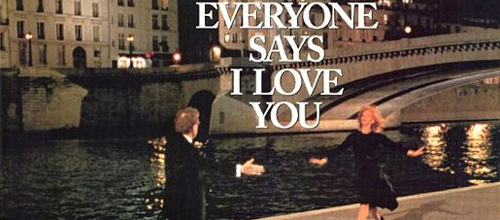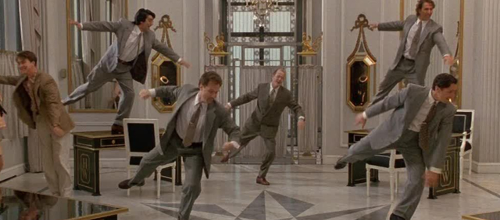

 | Dir: Woody Allen
| Dir: Woody Allen
“I’m out of shape, I can’t jog. I haven’t touched my treadmill in weeks. 572 weeks. That’s 11 years.”
It’s surely not a coincidence that the ending of 1995’s Mighty Aphrodite, with its Greek chorus led musical theatre number, transitions us into 1996’s Everyone Says I Love You – a charming trip back the world of the Hollywood musical. It has all the hallmarks of Allen’s penchant for blurring and battling between the lines of fantasy and reality. Here he’s doing it with the the lightest of touches within the boldest of cinematic frameworks. As Roger Ebert expertly put it, the film “dances on a tightrope between comedy and romance, between truth and denial, between what we hope and what we know”.
During the writing of Annie Hall – when every creative concept and artistic device was on the table – Allen asked co-writer Marshall Brickman “What if the characters just sang at this point?” That notion is recycled into the essence of Everyone Says I Love You so magically that you’re glad it wasn’t wasted as a throw away feature in a film of overflowing credit.
Woody has always thrived in the realm of high concept and big ideas – Zelig, The Purple Rose of Cairo, Husbands and Wives. Not since Zelig has he challenged his photography talent so technically as he combines rich mise-en-scene, trademark lengthy master takes and complex choreography. As Allen explains: “When I see a movie, I want to see the dancers in front of me full length. I hate it when they cut to their feet. I hate it when they cut to their faces. I don’t like angle shots. I want to see it the way I see it if I pay $10 and I go to the city centre and the dancers are in front of me. You know, straight on.”
Some aesthetic highlights include: Tim Roth’s fleeting criminal love interest to Drew Barrymore plotting her abduction one minute, then elegently and smoothly serenading her the next; a group of ghosts (and one urn of ashes) in a funeral home rising from their caskets and lecturing everyone on enjoying life while you have it – with kicks to emphasise the point; a series of children on Halloween singing as the characters that they’re dressed as; and the film’s artistic and romantic peak with a gravity defying waltz along the banks of the River Seine. Allen has not been so single-mindedly romantic since Manhattan and the result is cinema that’s sublime.
The songs themselves that accompany the dances are corny in the best way, playing homage but also gesturing of parody. They’re well placed within the pacing of the film, more summarising character thoughts than driving the narrative forward, but never overstay their welcome. Even Allen’s sole solo serenade – so gentle and vulnerable and almost inaudible – is rather sweet despite the obvious limitations of the performer. But outright illustrating those limitations was his artistic intention. Through the vocal performances he wanted to capture “the aspirations of your most intense feelings musicalized…If they sang like like regular people, that’s the idea”.
Despite these limitations, it’s Allen’s funniest performance since Hannah and Her Sisters; a more mature take on his inept, bumbling persona as he manipulates his way into the heart of Julia Roberts. The dramatic eavesdropping motif in Another Woman originally began as a comic notion when Allen was interested in creating something more Chaplinesque. Like he did with he unused idea for Annie Hall, it is recycled here to comic success. Although he had never truly gone away, you could argue that Allen the witterist also makes a grand return to form: “Yes she was a heroin addict, but I thought it was insulin”; “Minnie’s been dead for 20 years grandpa” – “I’m not arguing that. Im just saying if she calls I’ll be home later”; and the magnificent “I’m gonna kill myself. I should go to Paris and jump off the Eiffel Tower – I’ll be dead. You know, in fact, if I get the Concord I could be dead three hours earlier, which would be perfect. Or, wait a minute. With the time change, I could be alive for six hours in New York but dead three hours in Paris. I could get things done and I could also be dead!”
But all was not on new upward trend for Allen. Behind the scenes, his partnership with Jean Doumanian’s Sweetland Films brought with it some merciless budgetary compromises now he was separated from direct Studio financing. This would be his last film with longtime producer Robert Greenhut (after 20 years since Annie Hall) and costume Designer Jeffrey Kirkland (since 1980’s Stardust Memories).
The medley of stories among this family are connected by Djuna’s (Natasha Lyonne) character-led narration of her summer vacation, and it somewhat sweetly ties together at the end to provide a justification for the device – “You better make it into a musical or no one’s going to believe it!” On the surface theyall say very little with no genuine drama or consequences, but together they become little pockets of escapist fun. It’s quintessential Woody Allen, with a few jazz hands to boot.
Part of Woody Wednesday. First viewing.
